Viorica Pătrăucean
Learning from Streaming Video with Orthogonal Gradients
Apr 02, 2025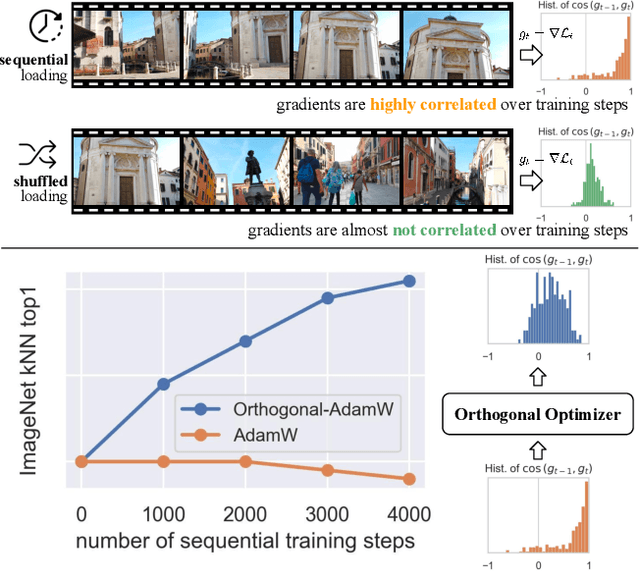
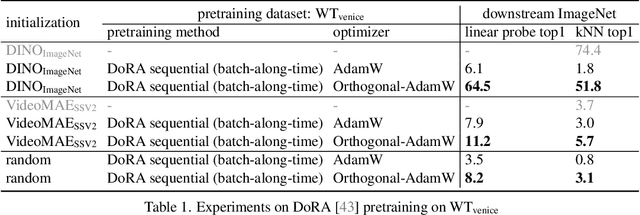
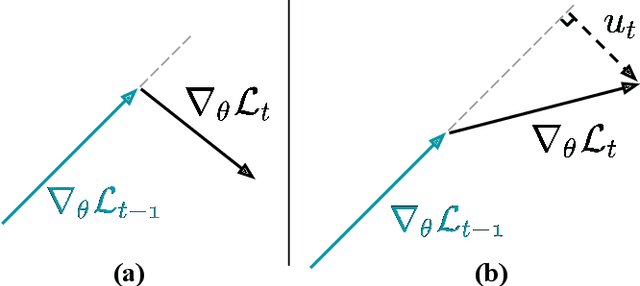
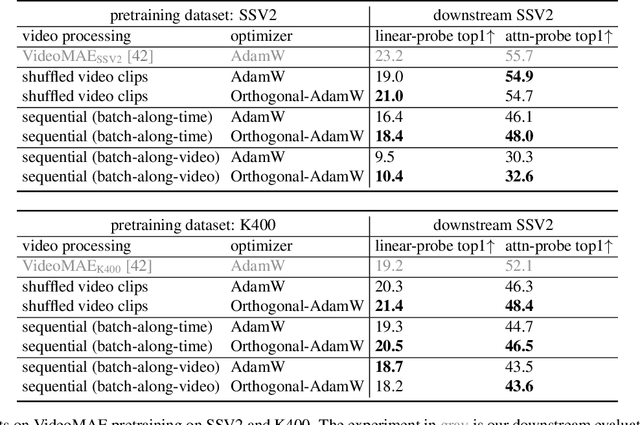
Abstract:We address the challenge of representation learning from a continuous stream of video as input, in a self-supervised manner. This differs from the standard approaches to video learning where videos are chopped and shuffled during training in order to create a non-redundant batch that satisfies the independently and identically distributed (IID) sample assumption expected by conventional training paradigms. When videos are only available as a continuous stream of input, the IID assumption is evidently broken, leading to poor performance. We demonstrate the drop in performance when moving from shuffled to sequential learning on three tasks: the one-video representation learning method DoRA, standard VideoMAE on multi-video datasets, and the task of future video prediction. To address this drop, we propose a geometric modification to standard optimizers, to decorrelate batches by utilising orthogonal gradients during training. The proposed modification can be applied to any optimizer -- we demonstrate it with Stochastic Gradient Descent (SGD) and AdamW. Our proposed orthogonal optimizer allows models trained from streaming videos to alleviate the drop in representation learning performance, as evaluated on downstream tasks. On three scenarios (DoRA, VideoMAE, future prediction), we show our orthogonal optimizer outperforms the strong AdamW in all three scenarios.
Scaling 4D Representations
Dec 19, 2024



Abstract:Scaling has not yet been convincingly demonstrated for pure self-supervised learning from video. However, prior work has focused evaluations on semantic-related tasks $\unicode{x2013}$ action classification, ImageNet classification, etc. In this paper we focus on evaluating self-supervised learning on non-semantic vision tasks that are more spatial (3D) and temporal (+1D = 4D), such as camera pose estimation, point and object tracking, and depth estimation. We show that by learning from very large video datasets, masked auto-encoding (MAE) with transformer video models actually scales, consistently improving performance on these 4D tasks, as model size increases from 20M all the way to the largest by far reported self-supervised video model $\unicode{x2013}$ 22B parameters. Rigorous apples-to-apples comparison with many recent image and video models demonstrates the benefits of scaling 4D representations.
TRecViT: A Recurrent Video Transformer
Dec 18, 2024Abstract:We propose a novel block for video modelling. It relies on a time-space-channel factorisation with dedicated blocks for each dimension: gated linear recurrent units (LRUs) perform information mixing over time, self-attention layers perform mixing over space, and MLPs over channels. The resulting architecture TRecViT performs well on sparse and dense tasks, trained in supervised or self-supervised regimes. Notably, our model is causal and outperforms or is on par with a pure attention model ViViT-L on large scale video datasets (SSv2, Kinetics400), while having $3\times$ less parameters, $12\times$ smaller memory footprint, and $5\times$ lower FLOPs count. Code and checkpoints will be made available online at https://github.com/google-deepmind/trecvit.
Perception Test 2024: Challenge Summary and a Novel Hour-Long VideoQA Benchmark
Nov 29, 2024



Abstract:Following the successful 2023 edition, we organised the Second Perception Test challenge as a half-day workshop alongside the IEEE/CVF European Conference on Computer Vision (ECCV) 2024, with the goal of benchmarking state-of-the-art video models and measuring the progress since last year using the Perception Test benchmark. This year, the challenge had seven tracks (up from six last year) and covered low-level and high-level tasks, with language and non-language interfaces, across video, audio, and text modalities; the additional track covered hour-long video understanding and introduced a novel video QA benchmark 1h-walk VQA. Overall, the tasks in the different tracks were: object tracking, point tracking, temporal action localisation, temporal sound localisation, multiple-choice video question-answering, grounded video question-answering, and hour-long video question-answering. We summarise in this report the challenge tasks and results, and introduce in detail the novel hour-long video QA benchmark 1h-walk VQA.
Perception Test 2023: A Summary of the First Challenge And Outcome
Dec 20, 2023Abstract:The First Perception Test challenge was held as a half-day workshop alongside the IEEE/CVF International Conference on Computer Vision (ICCV) 2023, with the goal of benchmarking state-of-the-art video models on the recently proposed Perception Test benchmark. The challenge had six tracks covering low-level and high-level tasks, with both a language and non-language interface, across video, audio, and text modalities, and covering: object tracking, point tracking, temporal action localisation, temporal sound localisation, multiple-choice video question-answering, and grounded video question-answering. We summarise in this report the task descriptions, metrics, baselines, and results.
Learning from One Continuous Video Stream
Dec 01, 2023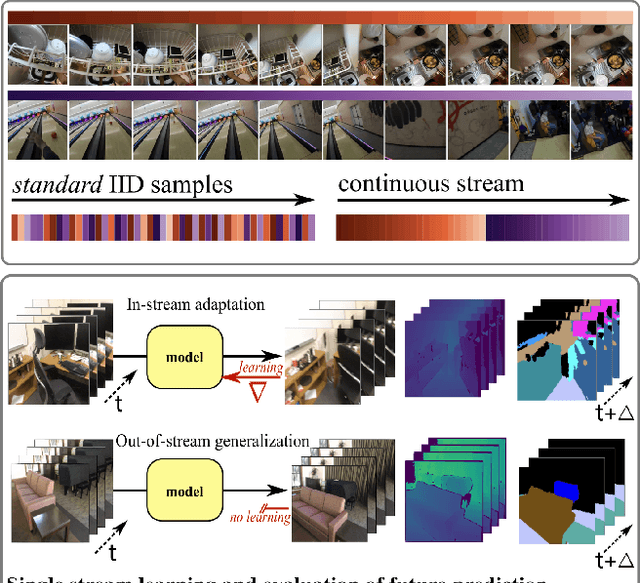

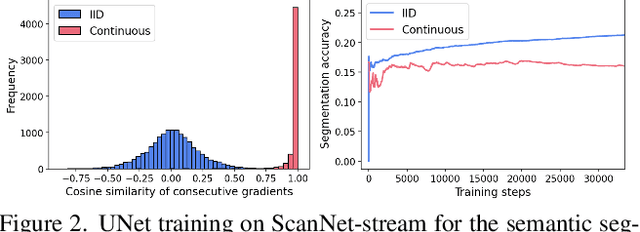

Abstract:We introduce a framework for online learning from a single continuous video stream -- the way people and animals learn, without mini-batches, data augmentation or shuffling. This poses great challenges given the high correlation between consecutive video frames and there is very little prior work on it. Our framework allows us to do a first deep dive into the topic and includes a collection of streams and tasks composed from two existing video datasets, plus methodology for performance evaluation that considers both adaptation and generalization. We employ pixel-to-pixel modelling as a practical and flexible way to switch between pre-training and single-stream evaluation as well as between arbitrary tasks, without ever requiring changes to models and always using the same pixel loss. Equipped with this framework we obtained large single-stream learning gains from pre-training with a novel family of future prediction tasks, found that momentum hurts, and that the pace of weight updates matters. The combination of these insights leads to matching the performance of IID learning with batch size 1, when using the same architecture and without costly replay buffers.
Perception Test: A Diagnostic Benchmark for Multimodal Video Models
May 23, 2023


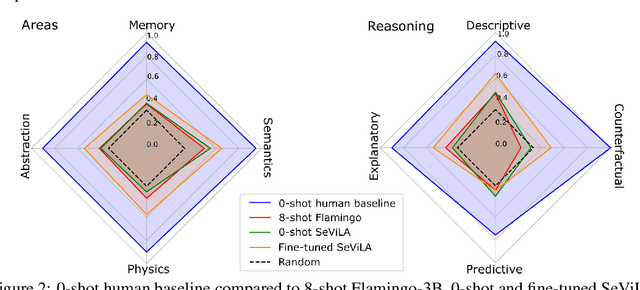
Abstract:We propose a novel multimodal video benchmark - the Perception Test - to evaluate the perception and reasoning skills of pre-trained multimodal models (e.g. Flamingo, BEiT-3, or GPT-4). Compared to existing benchmarks that focus on computational tasks (e.g. classification, detection or tracking), the Perception Test focuses on skills (Memory, Abstraction, Physics, Semantics) and types of reasoning (descriptive, explanatory, predictive, counterfactual) across video, audio, and text modalities, to provide a comprehensive and efficient evaluation tool. The benchmark probes pre-trained models for their transfer capabilities, in a zero-shot / few-shot or limited finetuning regime. For these purposes, the Perception Test introduces 11.6k real-world videos, 23s average length, designed to show perceptually interesting situations, filmed by around 100 participants worldwide. The videos are densely annotated with six types of labels (multiple-choice and grounded video question-answers, object and point tracks, temporal action and sound segments), enabling both language and non-language evaluations. The fine-tuning and validation splits of the benchmark are publicly available (CC-BY license), in addition to a challenge server with a held-out test split. Human baseline results compared to state-of-the-art video QA models show a significant gap in performance (91.4% vs 43.6%), suggesting that there is significant room for improvement in multimodal video understanding. Dataset, baselines code, and challenge server are available at https://github.com/deepmind/perception_test
 Add to Chrome
Add to Chrome Add to Firefox
Add to Firefox Add to Edge
Add to Edge